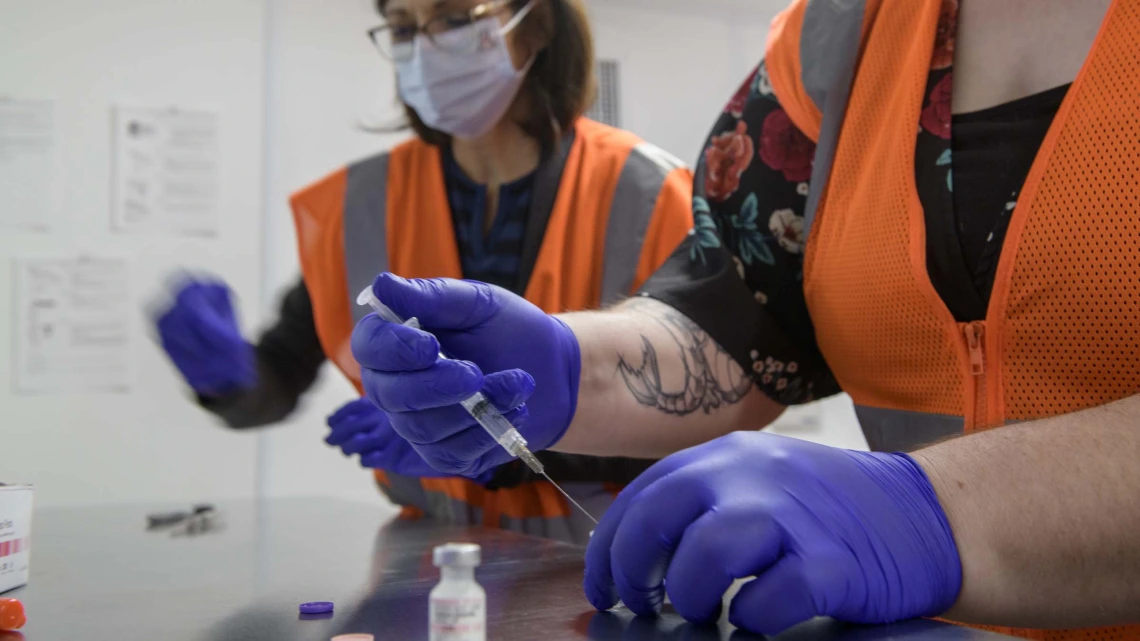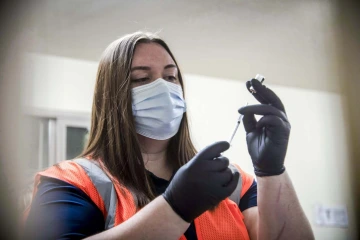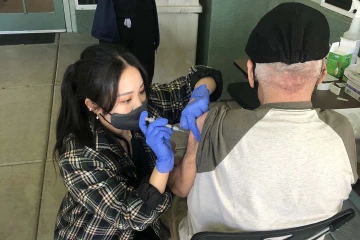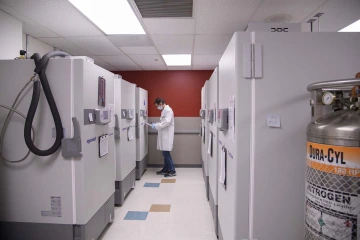PharmD Students Sharpen Skills on the Pandemic’s Front Lines
Whether they’re behind the scenes mixing vaccines or putting shots in patients’ arms, PharmD students are getting hands-on job training.

UArizona Campus Health registered pharmacist Elizabeth Preble (left) and fourth-year College of Pharmacy student Annie Hiller prepare to mix the Pfizer vaccine with saline.
More than a year into the COVID-19 pandemic, there is still much work to be done in fighting the disease, and faculty, staff and students from the five University of Arizona Health Sciences colleges are rising to the challenge. Many of those stepping up are College of Pharmacy students, eager to gain clinical experience and use their skills in a real-world setting.

PharmD student Annie Hiller mixes the contents of a vial of Pfizer vaccine with a saline solution to prepare it for the UArizona POD.
“As the vaccines become available to more and more people, clinics need a lot more people to help out,” Wan said. “That’s where pharmacy students are able to come in.”
Annie Hiller, a fourth-year PharmD student, has been working at the state-run University of Arizona Point of Distribution (POD) for Pima County, busily preparing individual doses for patients’ arms.
“These are my neighbors, these are my friends, these are people I know,” Hiller said. “It’s good to know our community is getting the health care and the protection they’re going to need.”
Honing skills outside the classroom
Wan has volunteered at several vaccination sites, including in the SaddleBrooke community with Desert Life Pharmacy, the Banner Health clinic at the Arizona State Fairgrounds, and at a senior living community in the Phoenix area with the Mobile Health Unit. In addition to the extensive immunization training she has received as part of her pharmacy curriculum, her time volunteering has given her ample experience administering vaccines to patients.

PharmD student Lisa Wan administers a Moderna vaccine to a resident of a senior living facility outside Phoenix.
Hiller started volunteering at the UArizona POD as part of her community rotation with Campus Health, and stayed on even after her rotation was over. All PharmD students must complete community rotations at retail pharmacies, which Hiller says offer unique training she and her peers would be hard-pressed to find elsewhere.
“In the classroom, you learn a lot about the ‘book smarts’ — the studies that have been done, how things work — in a vacuum,” Hiller said. “In a community rotation, you actually interact with patients and get their feedback as to what’s really important to the people versus what’s important in the classroom.”
From ‘farm’ to pharmacist
Hiller says the behind-the-scenes work at the UArizona POD starts when, each week, new shipments of the Pfizer COVID-19 vaccine are delivered to the Tucson campus, where more than 15 freezers are kept at a controlled temperature of minus 112 degrees Fahrenheit.

Before the vaccine can be mixed and injected, it must be removed from a freezer and thawed.
“We call that the freezer farm,” Hiller said.
Before use, the vials are thawed overnight, then packed inside a cooler and transported by foot with a police escort to the POD. Once there, the pharmacy team is responsible for prepping thousands of doses each day.
“The vaccines come to us in a super-concentrated form,” Hiller said. “We add saline so we can get the appropriate number of doses — typically six doses per vial.”
In that manner, each tray of 195 vials can be expanded into more than 1,100 doses — and Hiller says the freezer farm stores four or five trays at a time, enabling the team to keep the POD well-stocked with the in-demand vaccine.
Instilling confidence
In addition to providing immersive training and benefiting their communities, Wan and Hiller recognize these experiences are shaping them into better health care providers.
“I’ve grown confident in talking and communicating with patients, especially with the massive amount of misinformation out there,” Wan said. “You get a lot of questions about all types of things when you give out the vaccines. With our educational background, we’re able to respond to members of the public who are hesitant about getting the vaccine.”
“I feel much more confident, compared to a year ago when I was shaking as I gave my first flu shot to a real person.”Lisa Wan, second-year PharmD student, College of Pharmacy
While this community outreach gives students the opportunity to counter vaccine-related misinformation in the midst of the pandemic, community rotations have always allowed PharmD students to improve their communication skills. Prior to her rotation with the Campus Health pharmacy, Hiller also did community rotations at Walmart and Walgreens pharmacies.
“Those sites gave me the ability to interact directly with patients. They helped me develop my confidence in speaking with people, being a bridge between health care and the patients,” Hiller said. “There’s this misconception that pharmacists just stand behind a counter and count pills, but that’s no longer the case. People can come to us any time of day to ask questions about their health care.”
This direct experience with patients helps future pharmacists know they’re on the right track.
“The most important thing I’ve learned about myself is that I really like what I’m doing,” Wan said about what her volunteer experiences have taught her. “Recognizing that I can probably do this all day reassures me that I’m passionate about what I’m doing and I’ve made the right choice.”

